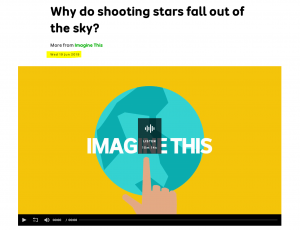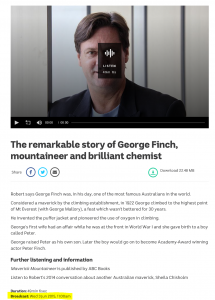Teachers and students might use podcasts as part of classroom activities, for homework or for general TAFE activities (eg updating students on TAFE events).
Teachers might use podcasts to:
- provide foreign language lessons to students
- as part of revision and homework tasks
- facilitate self-paced and distance learning or
- assist students with reading difficulties or other disabilities.
Students might use podcasts:
- as part of an assignment or
- to present news, interviews or other content.
These activities will require playing, uploading and/or copying the podcast. This information sheet covers the playing, copying and uploading of publicly available podcasts in TAFEs. For more information on creating podcasts in TAFEs, see Podcasts – Creating (TAFE).
What is a podcast?
A “podcast” is a digital media file. It usually comprises visual and audio copyright material, including pictures, film and sound recordings.
Podcasts can be downloaded to devices such as laptops, tablets or mobile phones. Once downloaded, users can view/listen to a podcast wherever and whenever they choose.
Teachers using podcasts
There are different rules for teachers using podcasts, depending on whether the teacher is simply playing a podcast or is copying and/or uploading it. If copying/uploading teachers also need to consider whether or not the podcast is of a program that was broadcast on free-to-air radio or television.
Playing podcasts in class
Teachers may be able to rely on the exception in section 28 of the Copyright Act if they want to play a podcast to their class (includes distance education classes). This includes:
- playing a podcast using a DVD player, or electronic device in the classroom or from an online website (eg ABC iView or YouTube)
- using an electronic delivery system to transmit a podcast from a central DVD player in the library to a monitor in the classroom
- using virtual classroom software to show a podcast, to external students
- playing a podcast in a virtual class over Skype, Google Hangouts or other online communication platforms and
- playing a podcast from a content or learning management system (such as Moodle or ClickView) in class.
Sometimes, to play a podcast to your class you may need to first upload that podcast to your TAFE’s digital teaching environment (DTE). This is fine under section 28, however, as soon as the lesson is over, you must remove the podcast from the DTE.
For more information, see Performance and Communication of Copyright Material in TAFE Classes
Programs that have been broadcast on free-to-air radio or television
Teachers at WA TAFEs or at Bradfield Senior College in NSW can copy and/or communicate podcasts of programs that have been previously broadcast on free-to-air radio or television and made available on the broadcaster’s website (eg an episode of a Radio National program made available as a podcast on the ABC’s website) under the Statutory Broadcast Licence, provided it is being done for an educational purpose.
For all other TAFE institutes, see Use of Television Programs and Film by TAFE Institutes Without a Statutory Broadcast Licence.
If using podcasts under the Statutory Broadcast Licence, teachers should make sure the podcast can only be accessed by staff and students.
Programs that have not been broadcast on free-to-air radio or television
If a podcast is made available on the internet and is not of a program that has been previously broadcast on free-to-air radio or television, you still may be able to copy and communicate it. It will depend on whether:
- a copyright exception applies, such as fair dealing, flexible dealing, disability access exceptions or another statutory exception or
- the copyright owner has given permission.
It is important to note that broadcasters often upload content (eg on their website), which was not previously broadcast on free-to-air radio or television. For example:
- podcasts not previously broadcast by ABC that are uploaded to their website will list the date of upload, but there will be no broadcast details:

- by contrast, podcasts that were broadcast on ABC that are now available on their website, will list the original broadcast date and time at the end of the webpage where the podcast has been uploaded –

You should always check whether or not the podcast was previously broadcast. If yes, you may be able to rely on the Statutory Broadcast Licence (WA TAFE institutes and Bradfield College in NSW only). If no, you are only able to copy and communicate if you can rely on one of the copyright exceptions apply or you have permission.
Does a statutory exception apply?
Fair dealing
If a fair dealing exception applies, teachers will be able to copy and/or communicate a podcast without the permission of the copyright owner.
The fair dealing exceptions most relevant to teachers are:
- criticism or review – eg including a short extract of a podcast as part of a review for a relevant topic.
- parody or satire – eg using part of a podcast to make an engaging parody for students.
Remember, that to rely on a fair dealing exception the portion of the podcast used must be reasonable having regard to the purpose of the use. Otherwise, the use might not be ‘fair’.
For more information, see Students and Copyright
Flexible dealing
Under the flexible dealing exception, teachers can copy and/or communicate podcasts for non-commercial teaching purposes if the use is not covered by another exception or statutory or voluntary licence.
To determine if material can be included in a podcast, teachers must assess whether:
- the proposed copying and/or communicating is for a specific instructional purpose and
- the use isn’t ‘unreasonable’.
For more information, see Flexible Dealing.
Other exceptions
Teachers may be use podcasts under other exceptions in specific circumstances including:
- using and modifying podcasts for students with a learning disability, see Disability Access Exceptions or
- using podcasts in exams, see Copying for exams: What am I allowed to do?.
Has the copyright owner given permission?
There are three situations where you will have permission to copy and/or communicate the podcast:
- where the terms and conditions of use say that educational use is permitted
- where the material has been openly licensed (eg under Creative Commons) or is in the public domain or
- where the teacher has received permission from the copyright owner to copy and/or communicate the podcast (eg you may be able to get permission by asking the person or organisation listed at the ‘Contact Us’ section on the website).
Teachers should become familiar with websites that allow free educational use. They include:
- CC Search website
- Google (Advanced Search)
- YouTube (using Creative Commons filter in search under ‘Features’) and
- Wikimedia Commons.
If a teacher is making a podcast available under a statutory exception or with permission from the copyright owner, there may be limitations on how they can use it and how they should limit access to it (eg via password protected access).
Students using podcasts made available on the internet
If a podcast is made available on the internet (whether or not it has been previously broadcast on free-to-air radio or television), students can use it if:
- a fair dealing exception applies or
- the copyright owner has given permission.
Fair dealing
If a fair dealing exception applies, students will be able to use a podcast without the permission of the copyright owner.
The fair dealing exceptions most relevant to students are:
- research or study – eg students downloading a podcast for their research and study
- criticism or review – eg students reviewing a podcast for an assignment. The source material, the author and copyright owner (if different) must be identified, and
- parody or satire – eg students using part of a podcast to include in a parody or satire (such as in another podcast).
Remember, that to rely on a fair dealing exception the portion of the podcast used must be reasonable having regard to the purpose of the use. Otherwise, the use might not be ‘fair’.
For more information, see Students and Copyright.
Has the copyright owner given permission?
There are three situations where you will have permission to use the podcast:
- where the terms and conditions says that use for research and study is permitted
- where the material has been openly licensed (eg under Creative Commons) or is in the public domain and
- where the student has received permission from the copyright owner to use the podcast (eg you may be able to get permission by asking the person or organisation listed at the ‘Contact Us’ section on the website).
Students should become familiar with websites that allow free educational use. They include:
- CC Search website
- Google (Advanced Search)
- YouTube (using Creative Commons filter in search under ‘Features’ and
- Wikimedia Commons.
For further information see the Smartcopying website or contact your local copyright manager. You can also contact the National Copyright Unit on (02) 7814 3855 or by email at smartcopying@det.nsw.edu.au.
